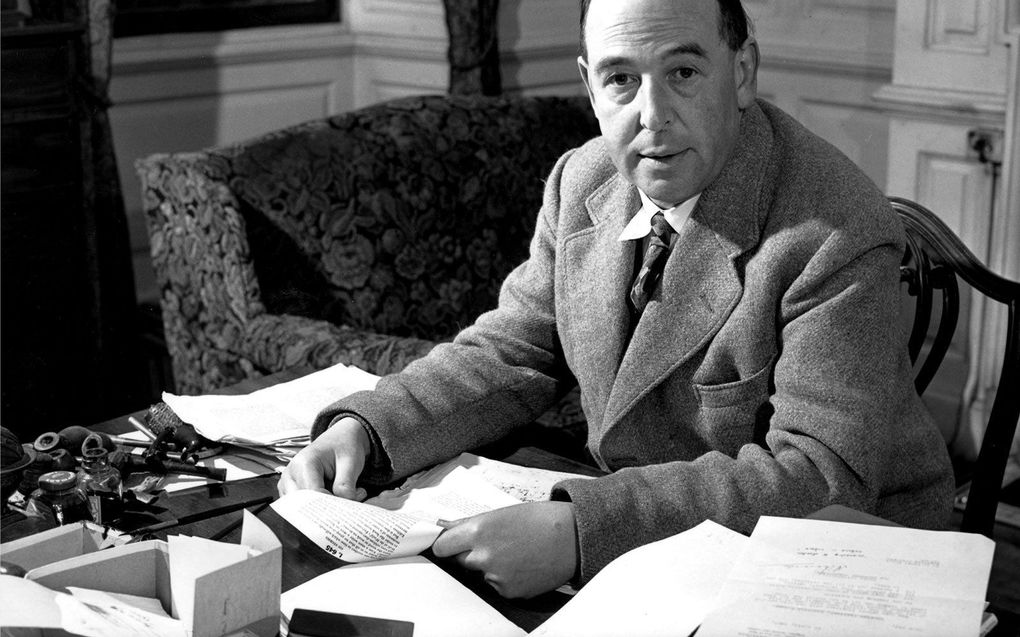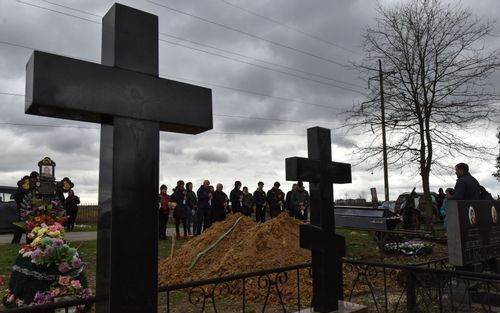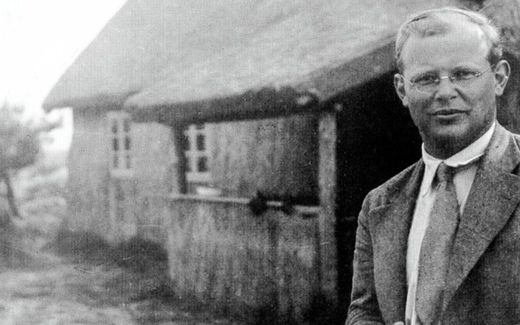C.S. Lewis: Let the Bible explain itself
08-10-2022
Christian Life
Maarten Stolk, RD

C.S. Lewis. Photo Wikimedia Commons, Aronsyne
Christian Life
C.S. Lewis is known as one of the most influential Christian thinkers of the 20th century. He thought systematic theology to be boring. Instead, the British writer, in amazement of God, focused on defending the Christian faith.
Lewis is a popular read. According to his biographer Alister McGrath that is mainly because he offers a "deeper view" of the Christian faith and manages to appeal to "reason, feeling and imagination". And that without compromise.
"What we see when we think we are looking into the depths of Scripture may sometimes be only the reflection of our own silly faces." *From "Reflections on the psalms*
Laurens van der Tang, a Dutch columnist and church elder, disagrees. Last spring, he wrote in "De Wachter Sions" (The watchman of Sion), the bulletin of a Dutch reformed denomination, that the books of Christian writers, such as Lewis, Dietrich Bonhoeffer and Tim Keller, have gained popularity among Reformed Christians.
"The question is whether this can be seen as a positive development." It cannot, he thinks, although he believes there is also quite a bit to learn from these "Big Three". Still, "critical" distance is necessary, according to Van der Tang. He argues that they did not pay enough attention to man's death state, the need for repentance and God's holy wrath on sin.
Apologist
What about C. S. Lewis (1898-1964)? He was not an orthodox Reformed theologian; that much is clear. Lewis was not even a theologian, even though he received a few honorary doctorates for his Christian writings.
"Of course, I pray for the dead. The action is so spontaneous, so all but inevitable, that only the most compulsive theological case against it would deter me." *From "Letters to Malcolm: Chiefly on Prayer"*
Lewis became a famous apologist: as a former atheist, he understood the difficulty people might have with the Christian faith. He was not concerned with defending a particular church denomination or a specific theological view but the Christian faith itself: "The faith that the apostles preached, that the martyrs testified to, that was contained in the confessions and explained by the church fathers."
Who is C.S. Lewis?
Clive Staples Lewis is born on 29 November 1898 in Belfast, Ireland. The son of a lawyer and a vicar's daughter studies English language and literature at Oxford. He worked in this ancient English university town for more than 30 years. The scholar of Magdalen College is known as a great connoisseur of English literature from the Middle Ages and Renaissance. Cambridge University later establishes a chair, especially for him.
In his book "Surprised by Joy", Lewis recounts how he came from atheism to the Christian faith. He describes his childhood, in which he was "absolutely not oriented towards another world", the death of his mother, the "slow apostasy" in boarding school, the influence of teachers and literature, the trench war in northern France, and finally: the return to "Joy."
"What I feared," Lewis writes, "had finally happened to me. In the summer trimester of 1929, I gave in and acknowledged God as God and knelt and prayed; that night, I was probably the most dejected and unwilling convert in all England."
Somewhere else, Lewis writes that his friends Hugo Dyson and J. R. R. Tolkien -author of the book "The Lord of the Rings"- brought him to the point where he dared to take the "leap of faith" and "accept what Christ accomplished on the cross."
Lewis has a fluent, versatile and sometimes sharp pen. He writes epic poems and science fiction stories; he publishes on medieval allegorical love poetry and on the possibility and probability of miracles.
"The Problem of Pain" from 1940 -World War II has broken out- is the first book in which Lewis emphatically acts as a defender of the Christian faith. After that, radio lectures appear on paper, such as "Mere Christianity" (1952). Between 1950 and 1956, the Narnia stories are published, a series of children's books that sold more than 100 million copies worldwide.
Lewis unexpectedly marries Helen Joy Davidman in April 1956. She is Jewish, 16 years younger than him, and from the United States.
Clive Staples Lewis dies on 22 November 1963, the day US President John F. Kennedy is assassinated. He is buried at the Anglican Holy Trinity Church in Oxford. On the grave is an inscription: "Men must endure their going hence."
Lewis called this "mere Christianity", a term he found in the books of the seventeenth-century Puritan Richard Baxter. He compared Christianity to a kind of hall with doors through which you can enter different rooms. "If I can bring anyone into that hall, I shall have done what I attempted. But it is in the rooms, not in the hall, that there are fires and chairs and meals."
"But, of course, being a Christian does mean thinking that where Christianity differs from other religions, Christianity is right, and they are wrong. As in arithmetic—there is only one right answer to a sum." *From "What are we to make of Jesus Christ?"*
Lewis did not have an elaborate doctrine of the Scriptures. The Bible does not call attention to itself, he thought, but only to the reality to which it refers. Lewis was, therefore, not interested in in-depth discussions about women in ministry or the debate on creation and evolution. However, he did believe that increasingly complex biological species emerged over millions of years - by God's intervention.
Lewis argued that one danger for theologians is that they are so busy proving that God exists that they don't give a moment's thought to Christ. They are like a book lover "who, with all his first editions and signed copies, never got around to actually reading those books."
Lewis felt most at home in classical Christianity, the Church of all ages, and the Anglo-Catholic tradition in the Church of England. He recognised that man is lost through his own fault, but election was not a significant issue for him.
"Come to Me, everyone who carries a heavy burden; I will set that right. Your sins are all erased, all of them; this I can do. I am Regeneration; I am Life. Eat Me, drink Me. I am your Food. And finally: do not be afraid; I have overcome the entire cosmos." That's what it's about." *From "What are we to make of Jesus Christ?"*
Lewis did, however, insist on the historicity of the facts of salvation, saw Jesus as truly being God and left room for miracles. "For it was He (God, ed.) Who at the beginning commanded all species 'to be fruitful and multiply and replenish the earth'," Lewis wrote in his book "Miracles". "And now the incarnate God is doing the same thing in the feeding of five thousand people - near and small, with His human hands, the hands of a craftsman, doing that which He had always done in seas, lakes and streams."
When Lewis spoke about the doctrine of atonement and the meaning of the cross of Christ, he usually did so using figurative language and literary figures rather than in a classical Reformed manner. In "The Problem of Pain" from 1940, for example, he argued that any atonement theory is secondary to its reality. His concern was that Christ's death restored the relationship between God and man rather than how this was achieved. The death and resurrection of the lion Aslan in the Narnia stories is another such image. Lewis's main aim in doing so was to show the reality behind the vision of atonement.
"There is no doctrine which I would more willingly remove from Christianity than this if it lay in my power. But it has the full support of Scripture and, especially, of our Lord's own words; it has always been held by Christendom, and it has the support of reason. If a game is played, it must be possible to lose it." *From "The Problem of Pain"*
Lewis's message was that there is an absolute separation between good and evil, heaven and hell. For there are only two kinds of people, according to him: "There are only two kinds of people in the end: those who say to God, 'Thy will be done,' and those to whom God says, in the end, 'Thy will be done.'" He demonstrated that premise in "The Great Divorce", an allegorical story in which the hell dwellers take a trip to heaven by bus. Remarkably, they do not want to stay there at all. They don't know what to do in a place where the residents think only of Christ. They remain day-trippers.
Not just imagination, reason also played an essential role in Lewis's thinking. In this, faith sometimes seems like a form of mathematics. For instance, while reasoning, Lewis gave evidence for the Trinity: God is love and from eternity the same. Love focuses on the other. So there must have been an Other even before creation. It follows that God consists of more than one Person.
Arranger
The University of St Andrews -the oldest in Scotland- awarded Lewis an honorary doctorate in 1946 because he managed to "translate" theology from the academy to the common man, intertwining "theological reflection and poetic imagination".
The combination of reason, feeling and imagination is also why Christians in many different surveys indicate that they see Lewis -rightly or not- as one of the most influential theologians of the 20th century. McGrath notes that Lewis was an arranger of theological ideas rather than a composer. But his variations are sometimes more memorable than the original piece of music.
"The Big Three"
The "Big Three", they are sometimes called. Dietrich Bonhoeffer, C.S. Lewis and Tim Keller are well-known and popular theological writers in the Christian world.
However, in pietistic Reformed circles, their works are not undisputed. The Dutch columnist and elder Laurens van der Tang writes a critical article on the "Big Three" in the church bulletin of the Reformed Church in the Netherlands and America (RCNA). He concludes that "distancing is appropriate" and that these "authors cannot replace theologians from the Reformation or the Dutch Second Reformation."
Also, the Dutch Rev. A. Schreuder writes that "whoever reads the works of the Big Three misses the ultimate point of the personal appropriation of salvation."
Who were the "Big Three"? This series sheds light on their work and the question of how we should look at them.
This is the second part of a triptych about three remarkable post-war theologians Dietrich Bonhoeffer, C.S. Lewis and Tim Keller
Related Articles





